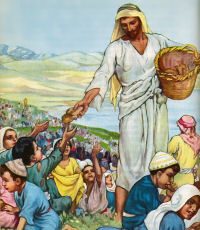Have you ever noticed that sometimes when you bring your gifts to Jesus as this young boy did, nothing much seems to happen? They just seem to sit there, undeveloped and underappreciated. Did you ever think that perhaps, to use a business parallel, the blockage is on the distribution side?
Jesus didn’t tell his disciples to just sit quietly while he multiplied the loaves. He told them to have the people recline—he told them to get the crowd ready for the miracle he was about to do. Similarly, Elisha didn’t explain away his servant’s objections, he simply repeated his instruction: “Give [the food] to the people to eat” (2 Kings 4:43). It wasn’t time to sit by and wait for Jesus to do something; it was time to get to work! And so the disciples organized the people into groups sitting on the grass, and Elisha’s servant started handing out the food. That’s when the miracles happened.
So if you want to see your offerings to God multiplied, you have an essential role to play. You may not be working the miracle yourself, but you do need to get out there and do something! It’s impossible to know what that “something” is in each situation. We all have different gifts, different life situations, different opportunities that will present themselves today. But one thing is sure: Each of us will have an opportunity to do something important for the kingdom of God.
Starting today, try your best to be open to your Father’s promptings when it comes to the people you meet, the situations you encounter, and the movements of your heart. And then take a step in whatever direction you think he is leading you. The result may surprise you!
“Heavenly Father, I am not sure how to start. But I will take a step in faith today. Show me what you have for me to do, and how my gifts can bear fruit for your kingdom.”
Questions for Reflection or Group Discussion
(2 Kings 4:42-44; Psalm 145:10-11,15-18; Ephesians 4:1-6; John 6:1-15)
1. In the first reading the prophet Elisha feeds a hundred people in a story that prefigures Christ’s miracle of the multiplication of loaves. In the “Our Father,” we ask the Lord for “our daily bread.” In what ways does the Lord feed you and provide you with daily sustenance?
2. In the responsorial Psalm we read again that God feeds his “faithful ones” and satisfies all of their desires. What are the desires in your life that bring you closer to God? What are the desires in your life that keep you from God?
3. The Responsorial Psalm goes on to say these words: “The Lord is near to all who call upon him, to all who call upon him in truth.” How important do you think it is to call upon the Lord in a daily time of personal prayer and Scripture reading? If you don’t have a daily time of personal prayer and Scripture reading, are you willing to commit 15 minutes a day to it? If not, what are your reasons?
4. In today’s short reading from the letter to the Ephesians, St. Paul urges us to “to live in a manner worthy of the call you have received.” As inspiring as these words are, we all tend to reduce this invitation to specific points of action: I have to do this good thing and I have to avoid that temptation. But these can all be just a matter of human striving and doesn’t necessarily lead to fulfilling God’s call. How would you describe God’s call for your life? What new steps can you take to change the things in your life that are keeping you from living “in a manner worthy of the call”?
5. The Gospel relates the story of the multiplication of the loaves, which itself prefigures the Eucharist. The bread in this story sustains earthly life, while the Eucharist sustains us for eternity and is the full manifestation of Christ’s boundless love for us. It is a meal we share together in humility as Catholics, a sign and cause of unity. What steps can you take to deepen your experience of Christ, and his love for you, when you receive the Eucharist?
6. In the meditation, we hear these words: “We all have different gifts, different life situations, different opportunities that will present themselves today. But one thing is sure: Each of us will have an opportunity to do something important for the kingdom of God.” The meditation goes on to encourage us with these words: “Starting today, try your best to be open to your Father’s promptings when it comes to the people you meet, the situations you encounter, and the movements of your heart. And then take a step in whatever direction you think he is leading you. The result may surprise you!” What obstacles get in the way of your saying yes to the “Father’s promptings”? What can you do to overcome them?
7. Take some time now to pray for a greater openness to using the gifts God has giving you to bear fruit for his kingdom. Use the prayer at the end of the meditation as the starting point.
